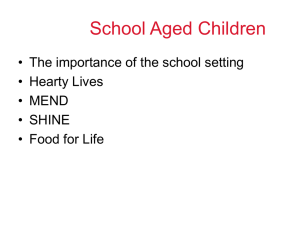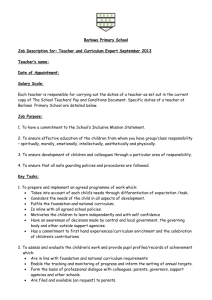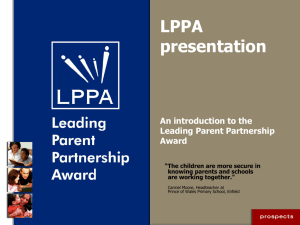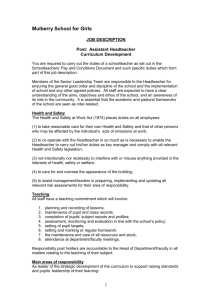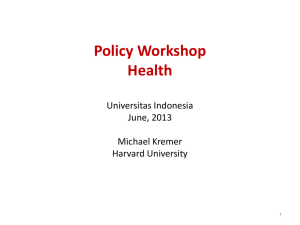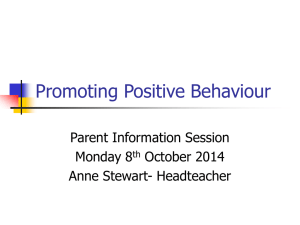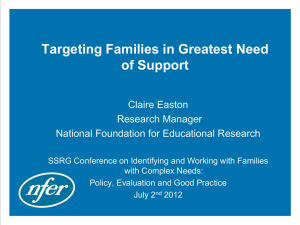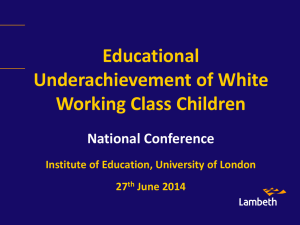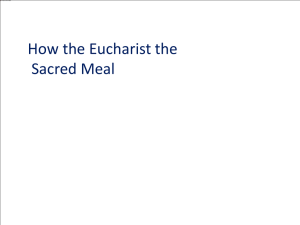What the schools say - Cornwall Healthy Weight
advertisement
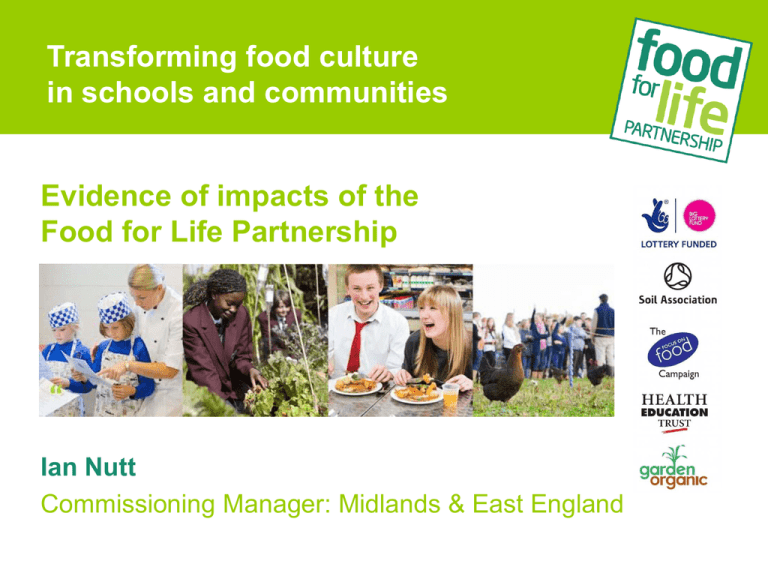
Transforming food culture in schools and communities Evidence of impacts of the Food for Life Partnership Ian Nutt Commissioning Manager: Midlands & East England Transforming food culture “TV chef Jamie Oliver is credited with putting school food back on the political agenda. However, the most ambitious programme in the UK to date has been the Food for Life partnership, which champions a whole-school approach and is working with 3,600 schools in England to enable children to eat good food, learn where it comes from, how it is produced, and how to grow it and cook it themselves.” Kevin Morgan, professor of governance and development in the School of city and regional planning at Cardiff University, April 2011 What is FFLP? Multiple outcome intervention that uses food to engage young people and their families and nudge them towards the behaviours that matter for public health, sustainability and education. We achieve this through a framework for whole school approach to food, drawing on networks of stakeholders & partners and giving schools a measurable awards programme that embeds a new food culture. Who is the FFLP? How does FFLP work? Awards scheme (Bronze, Silver & Gold) concentrating on 4 strands: Food Leadership: parents, staff, pupil & governors Food quality/provenance: local, fresh, seasonal, organic, animal welfare Food Education: embedding in curriculum & whole school education Food Culture & Community: dining experience, events & parent/community engagement What impacts have we had? • 3-year programme evaluation by the University of the West of England (UWE) and Cardiff University • Supporting studies by New Economics Foundation (NEF), National Foundation for Educational Research (NFER) and Centre for Research in Education and the Environment (CREE) Public health impacts An increase in the number of primary school-age children reporting eating • 5-a-day went up 5% points to 21% • 4-a-day went up 12% points to 49% Significant positive associations between pupil participation in cooking, growing, farm visits and these reported increases. Impact travels home 45% parents report eating more vegetables as direct result of the Food for Life Partnership 43% parents report changed food shopping behaviour Free school meal take-up Over a 2-year evaluation (July 2008 – September 2010) free school meal take-up increased • + 13% points on average • + 20.9% points in secondary school • + 21% points in Silver/Gold schools These figures can be compared to national figures (August 2009 – September 2010) • + 0.2% points in primaries • + 2.7% points in secondaries School meal take-up 3.7% point increase in first year of evaluation (2008 - 2009) Nationally, take-up decreased 3.7% points in primary schools that year. 5% point increase over two years of evaluation (2008 - 2010) Impact greatest in: • Secondary schools (+5.7%) • Gold schools (+6.0%) • Disadvantaged schools (+7.1%) School meals: social return on investment for local authorities NEF: for every £1 invested in Food for Life menus, there is a return of over £3 in value to the local economy and society. Most of this value lies in local economic opportunities around supplying local, seasonal food, and resulting employment. Learning impacts - UWE Twice as many Food for Life Partnership primary schools received an Ofsted rating of outstanding following their participation (37.2% compared to 17.3% pre-enrolment). Attainment levels in Food for Life Partnership schools increased at a greater rate than the national average. Learning impacts - NFER Head teachers report a positive impact on pupil behaviour, attention and attainment. “In addition to all the other things, the biggest impact has been in engagement, enjoyment, learning, their learning behaviours have improved, they are very positive.” Headteacher, cited in National Foundation for Educational Research (NFER) evaluation What the schools say “Being part of the Food for Life Partnership is the best initiative that we as a school have undertaken in the last 10 years. It isn’t about ticking boxes, it’s about hands on experiences for the children which will stay with them for life. It gives the children skills which have disappeared over the last generation and prepares them for their future.” Penny Wetton, Headteacher, Helpringham Primary, Lincolnshire (Silver award) What the schools say… “The children are developing new skills, gaining in confidence. The Food for Life Partnership has raised awareness of the whole of food culture and the children really enjoy this aspect of our curriculum. Many people comment on how food orientated we are, which I feel is invaluable because we have been identified as an area with a high obesity problem.” Rowena Herbert, Headteacher, Bolsover Junior School, Chesterfield (Gold award)
